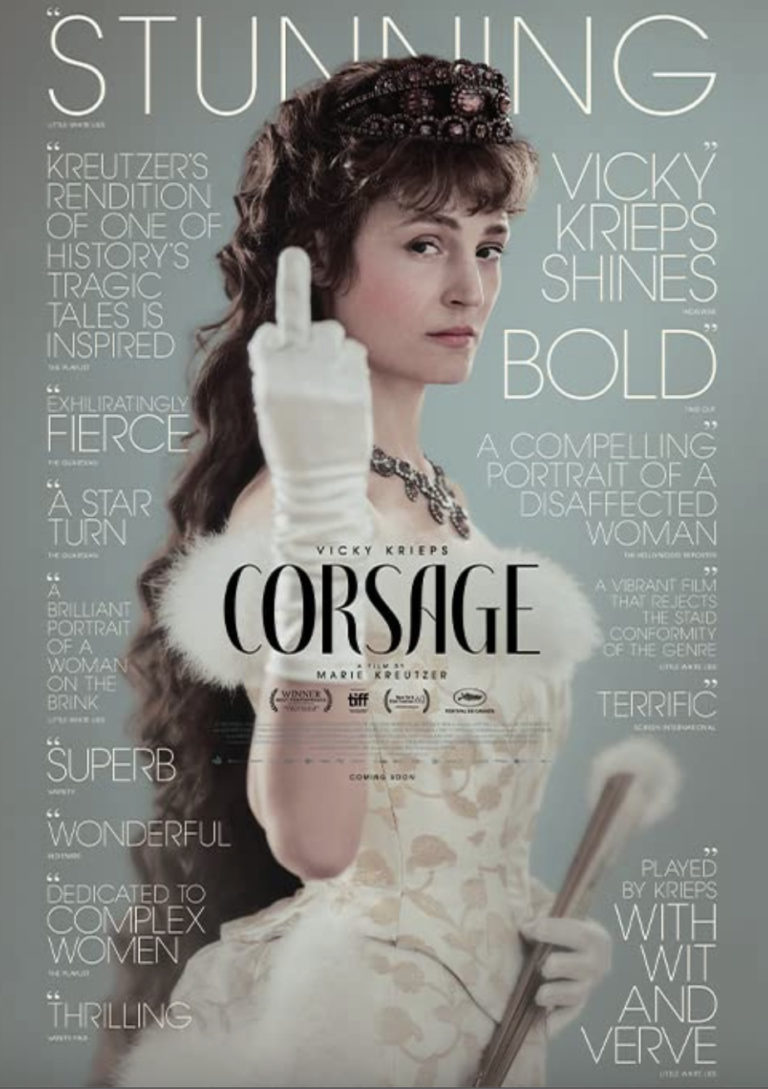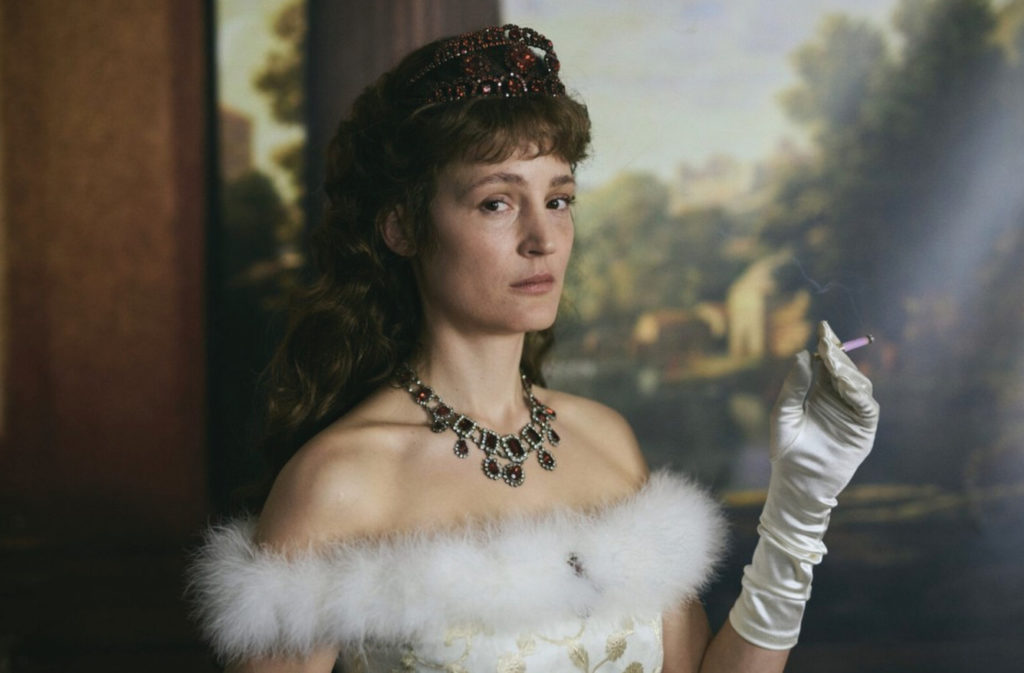
SYNOPSIS : As she celebrates her 40th birthday in 1877, Elisabeth, Empress of Austria and Queen of Hungary, finds herself lacing her trademark corset ever tighter to remain relevant in a world that is leaving her behind. Once a beloved symbol of the splendor of her empire, Elisabeth has become the object of salacious gossip and condescending rumors as she ages. Denied a meaningful role in government by her husband, the Emperor Franz Joseph, she begins to indulge in silent acts of rebellion — smoking publicly, sending masked imposters to official appearances and traveling relentlessly through Europe. Acutely aware of the limitations of her gender, she shakes the bars of her gilded cage until she finds a way to define her own life and legacy.
In this sumptuous and subversive new biography, writer and director Marie Kreutzer (“The Ground Beneath My Feet“) frees a fiercely independent woman from the constraints of her era and rank for a life on her own terms. Star and producer Vicky Krieps (“Phantom Thread,” “Bergman Island,” “Old“) earned an Un Certain Regard Best Actor Award at the 2022 Cannes Film Festival for her unforgettable performance as a startling feminist hero.

Q: Empire Elisabeth is such a famous person in Austria. How come you wanted to make a film about her?
MK: It was really Vicky Krieps idea. We had made a film before and wanted to work together again. At one point she said casually, why don’t we make a film about Sisi (nickname for Empire Elisabeth). I laughed and said, why would we? I was just not interested, because she is that souvenir shop cliché in my country. But Vicky planted a seed and the idea stayed with me. I started to read about her and went to museums. I was open to see if there was something in the material that resonated with me.
And I focused on her 30s and 40s. If I’d make the film, I wanted Vicky, so it had to be around that age. It was obviously an important time in her life, because it changed her when trying to fulfill all the expectations. In a silent act of rebellion. She was travelling as much as possible and doing all that physical exercise, which was not normal for a woman or for anyone at that time. She was a smoker and had tattoos. All these things that you could read as a provocation. I liked that. It is a story that has to do with all of us, especially women. We all must meet so many expectations and the society tell us to please in order to be loved. She is a great character for telling this story and I knew then I wanted to make a film about her. And it was fun to take that cliché and make something else.
Q: I am wondering about your approach to the script. The importance of historical accuracy and your own artistic decisions. Could you talk a bit about that?
MK: She is the first historical person I did such intense research about. One of the things I realized is that every biography is also an interpretation. Every biography I have about her is a thin book. They have to make it a story so people can read it and enjoy it. I am not judging that, and I am not saying it is fictionalized, but it is still an interpretation. That makes me free to make my own interpretation.
When it comes to historical accuracy, we rarely question the so-called facts. Someone reads it and somehow it turns out to be in every biography, but we don’t really know. For example, people always says that Sisi had very bad teeth. You can read it in every other biography. But at the Sisi Museum you can see the official document of her teeth that says she had perfect teeth. So why do people think her teeth were bad? Maybe because she ordered so many products because she was interested in taking care of them.
So, it is always an interpretation. And this is not a documentary anyway. It’s a fictional film no matter what. I would make up what happened behind close doors anyway. I might as well do my own thing here and I tried to stay true to what I read about her character. I thought she was so complex, and I wanted to show that without judging her, without making her either a good or a bad person. It was important for me that she would have different sides. Like we all have.
Q: You previously worked with Vicky Krieps in “We Used to Be Cool”. How much was she a part of shaping the character and the script? And what makes her so unique as an actor?
MK: She was not involved in the script at all. I would never involve actors. It is always my thing. At some point I would show it to some people, and I had a script consultor for this film whom I could discuss and share my concerns with. Producers would say that people won’t like this character. It happens every time I write a script. I think people are just not used to see women depicted as complexed as my characters are. It has become my mission to change that.
Vicky was of course very involved when preparing the film. She was already in Vienna doing physical preparation for riding and fencing and everything. We spent a lot of time together. I wouldn’t say we talked about the character so much, more about other things. What I love so much about her is that she can be very much in the moment. And she is observing herself and is very open and trustful. She comes to the set and let it happens. That is how I am too. I am very well prepared but when I am shooting, I let go of everything. I just try to create an authentic moment.
I don’t know any one like her, she is just unique and charismatic. She already has that empress kind of vibe. She brought a certain playfulness to the character that was not in the script. Very often I would just let the camera roll. Let her surprise me with the decisions she would make. For example, the now famous middle finger scene. She just did that when she walked out the room. It was not in the script. And she jumped out of the window after the fencing scene. It was in the script but for a completely different scene. That is why it is so great to work with her.
Q: Talking about that middle finger, the wonderful humor in the film mixed with seriousness. What was behind those choices?
MK: I think it always happens when I am writing a script. My favorite films always have moments of tragic and humor. Just as the complexity of the characters, and of life. It can be different every day and depends on whom you are with. That is what I am trying to reflect in my films. A lot was already in the script, but I also encouraged the actor’s playfulness during the shooting. I try to not repeat takes and I try do something different for each one. I give the actors different directions and they don’t know what I say to the others. So, they never really know what is going to happen. I think that makes it fresh and often it leads to comical moments. The funniest scene for us to shoot was when they were sitting by the long table, Sisi and the emperor. They are both such brilliant actors. No one knew what to expect when the camera was rolling. They are open and don’t care making a fool of themselves. I try to bring something loveable to every character and find something that the actors can love about their character.
Q: While watching the film my thoughts went to both “Spencer” and “The Favourite”, different approach to period films. Could you talk about your own inspirations making this film?
MK: I knew I didn’t want to make a typical period film. “Spencer” was shot just before we shot our film. But I didn’t know about that film at the time. I saw “The Favourite” and I love the director (Yorgos Lanthimos). I think he is the best in my generation, I admire everything he does. When I saw ‘The Favourite” I had almost finished writing the script for “Corsage” and I was like: ok, that is how you can do it. I was desperately looking for period films that would have a different approach. I enjoyed this one very much.
It wasn’t supposed to be a typical period film. But in the end, it is not so different if it is a period film or a comedy or a normal contemporary drama. My decisions are intuitive and based on the vision I have. I try not to think of the perfect result all the time. I prepare and have a strong vision, but then I try to let go. I didn’t really know what kind of film this would be, neither did Vicky. We just went along and created this together. That is really luxury.
Q: What do you think of the comparison between Empress Elisabeth and Lady Diana and women living in the public eye today? The image of perfection they must live up to.
MK: Actually, I think nothing has really changed. When Madonna turned 60, she said it’s a sin for a woman to age. I think it is even worst for women in the public eye and for women in a royal context. They have so many different rules, from the public and from home. I didn’t think so much about Diana. Although when I was writing the script, I would see magazine covers of Meghan Markle everywhere, but the headlines were always different. She was always judged for have been doing something wrong. Women in royal families are still not allow to work, make their own money, make their own decisions. They must sit in a certain way and dress in a certain way. They are not supposed to do anything without asking. The job of a woman, like Meghan Markle at that time or anyone else in that context, is to represent and to be nice. To be beautiful and perfect. That has not changed a bit, I think. It is very sad.
“Corsage” opens in New York on December 23rd, in L.A. on December 30th, and nationwide on January 6th through IFC Films.
Check out more of Niclas’ articles.
Here’s the trailer of the film.

